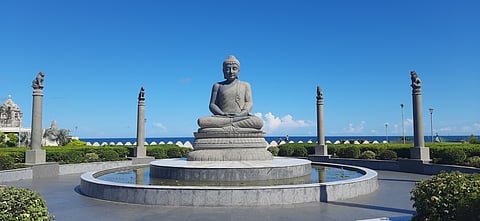
- Destinations
- Experiences
- Stay
- What's new
- Celebrating People
- Responsible Tourism
- CampaignsCampaigns
- SubscribeSubscribe
- Buy Now

Known for its scenic coastline and naval legacy, Visakhapatnam—or Vizag—is also a city steeped in history. If you're planning a trip and searching for Vizag places to visit, don't miss its rich cultural landmarks that span centuries. From ancient Buddhist sites like Thotlakonda and Bavikonda to colonial-era churches and war memorials, Vizag offers a deep dive into India’s layered past. Whether you're a history buff or just curious about heritage, the city has something to surprise and inspire.
Here, we explore the top 7 historical places in Vizag that tell powerful stories of faith, resilience, and exploration.
Located about 90 kilometres from Vizag, Borra Caves are a natural wonder with a rich historical significance. These limestone caves, believed to be over a million years old, are nestled in the Ananthagiri Hills of the Eastern Ghats. The caves are known for their impressive stalactites and stalagmite formations, which have inspired local legends and religious significance. According to local lore, the caves were discovered by a British geologist in 1807, but they have been a worship site for the local tribes for centuries. Exploring these caves gives visitors a glimpse into the geological and cultural history of the region.
Vizag's connection to ancient Buddhist heritage is evident in sites like Thotlakonda, a hilltop Buddhist complex around 15 kilometers from the city. Thotlakonda was a significant Buddhist centre between the 2nd century BCE and the 3rd century CE. The site, which overlooks the Bay of Bengal, consists of stupas, chaityas (prayer halls), viharas (monasteries), and other structures that indicate the presence of a thriving monastic community. Excavations have revealed that Thotlakonda was part of the maritime trade route and attracted monks from far-off regions, making it an important site for understanding the spread of Buddhism in India.
Another prominent Buddhist site in Vizag is Bavikonda, located about 16 kilometers from the city centre. Bavikonda, meaning "hill of wells," is one of the oldest Buddhist sites in the region, dating back to the 3rd century BCE. The site features many stupas, wells, and other structures, indicating that it was a major monastic complex. The presence of ancient relic caskets, inscribed pottery, and coins unearthed during excavations provides valuable insights into the history of Buddhism in the region.
For those interested in exploring the city's more recent history, the Visakha Museum, also known as the Visakhapatnam Municipal Museum, is a must-visit. Located on the beachfront, the museum is housed in a colonial-era Dutch bungalow and showcases a wide range of artefacts related to the history of Vizag. The museum's exhibits include weaponry, ancient manuscripts, coins, maps, and models of warships that tell the story of Vizag's maritime history. The museum has sections dedicated to the tribal culture of the region and the freedom struggle, making it a comprehensive resource for understanding the diverse historical influences that have shaped Vizag.
A unique attraction for history buffs, the INS Kurusura Submarine Museum is the first in South Asia. The museum is housed inside the INS Kurusura, a decommissioned Soviet-built submarine that served in the Indian Navy for over three decades. The submarine, now permanently stationed on RK Beach, offers visitors a rare opportunity to explore the life of naval personnel during missions. The museum's exhibits include the control room, living quarters, and torpedo section, providing an immersive experience of India's naval history. The INS Kurusura Submarine Museum is a testament to Vizag's strategic importance as a naval base and its role in safeguarding India's maritime interests.
While primarily known for its scenic views and recreational facilities, Kailasagiri Hill is also home to several historical monuments that reflect Vizag's cultural heritage. The hill is adorned with statues of Shiva and Parvati, which are religious symbols and significant markers of the region's historical connection to Hinduism. The hilltop also offers views of the city and the Bay of Bengal, making it an ideal spot to reflect Vizag's historical evolution from an ancient settlement to a bustling modern city.
Ross Hill Church is one of the oldest churches in Vizag and holds historical significance due to its colonial past. Perched atop Ross Hill, one of the three hills that make up the city's landscape, the British built the church in the 19th century. The church's architecture blends British and Indian styles, offering picturesque city views. The church's location, along with the nearby Dargah Konda and Venkateswara Konda, reflects the religious diversity that has been a hallmark of Vizag's history.
Vizag is home to several heritage sites including Thotlakonda Buddhist Complex, INS Kursura Submarine Museum, Ross Hill Church, War Memorial, and the Dutch Cemetery in Bheemili. These spots offer insights into Vizag’s Buddhist, colonial, and naval history.
Thotlakonda is an ancient Buddhist monastery dating back to 200 BCE. It served as a centre for Buddhist monks and traders and offers a panoramic view of the Bay of Bengal. The site includes stupas, meditation halls, and relic chambers.
Located on RK Beach, the INS Kursura Submarine Museum is housed in a real, decommissioned Indian Navy submarine. It offers a rare look into naval life and India’s maritime defense history, making it one of Vizag’s most visited attractions.
The ideal time to visit is from October to March, when the weather is cooler and more comfortable for sightseeing. This season is perfect for outdoor exploration of forts, museums, and coastal monuments.
While you can visit 2–3 key sites in a day, a 2-day itinerary is better suited for covering Vizag’s main historical attractions at a relaxed pace. It allows time for both coastal views and museum visits.
